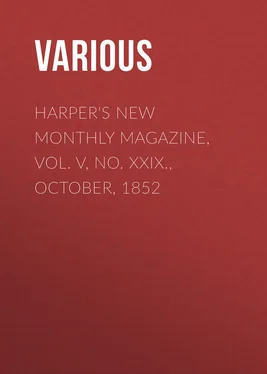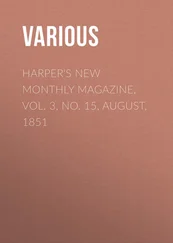Various - Harper's New Monthly Magazine, Vol. V, No. XXIX., October, 1852
Здесь есть возможность читать онлайн «Various - Harper's New Monthly Magazine, Vol. V, No. XXIX., October, 1852» — ознакомительный отрывок электронной книги совершенно бесплатно, а после прочтения отрывка купить полную версию. В некоторых случаях можно слушать аудио, скачать через торрент в формате fb2 и присутствует краткое содержание. Издательство: Иностранный паблик, Жанр: periodic, foreign_edu, на английском языке. Описание произведения, (предисловие) а так же отзывы посетителей доступны на портале библиотеки ЛибКат.
- Название:Harper's New Monthly Magazine, Vol. V, No. XXIX., October, 1852
- Автор:
- Издательство:Иностранный паблик
- Жанр:
- Год:неизвестен
- ISBN:нет данных
- Рейтинг книги:5 / 5. Голосов: 1
-
Избранное:Добавить в избранное
- Отзывы:
-
Ваша оценка:
- 100
- 1
- 2
- 3
- 4
- 5
Harper's New Monthly Magazine, Vol. V, No. XXIX., October, 1852: краткое содержание, описание и аннотация
Предлагаем к чтению аннотацию, описание, краткое содержание или предисловие (зависит от того, что написал сам автор книги «Harper's New Monthly Magazine, Vol. V, No. XXIX., October, 1852»). Если вы не нашли необходимую информацию о книге — напишите в комментариях, мы постараемся отыскать её.
Harper's New Monthly Magazine, Vol. V, No. XXIX., October, 1852 — читать онлайн ознакомительный отрывок
Ниже представлен текст книги, разбитый по страницам. Система сохранения места последней прочитанной страницы, позволяет с удобством читать онлайн бесплатно книгу «Harper's New Monthly Magazine, Vol. V, No. XXIX., October, 1852», без необходимости каждый раз заново искать на чём Вы остановились. Поставьте закладку, и сможете в любой момент перейти на страницу, на которой закончили чтение.
Интервал:
Закладка:
All France was however roused by the sleepless energy of Napoleon. The Electorate of Hanover was one of the European possessions of the King of England. Ten days had not elapsed, after the first broadside from the British ships had been heard, ere a French army of twenty thousand men invaded Hanover, captured its army of 16,000 troops, with 400 pieces of cannon, 30,000 muskets, and 3500 superb horses, and took entire possession of the province. The King of England was deeply agitated when he received the tidings of this sudden loss of his patrimonial dominions.
The First Consul immediately sent new offers of peace to England, stating that in the conquest of Hanover, "he had only in view to obtain pledges for the evacuation of Malta, and to secure the execution of the treaty of Amiens." The British minister coldly replied that his sovereign would appeal for aid to the German empire. "If a general peace is ever concluded," said Napoleon often, "then only shall I be able to show myself such as I am, and become the moderator of Europe. France is enabled, by her high civilization, and the absence of all aristocracy, to moderate the extreme demands of the two principles which divide the world, by placing herself between them; thus preventing a general conflagration, of which none of us can see the end, or guess the issue. For this I want ten years of peace, and the English oligarchy will not allow it." Napoleon was forced into war by the English. The allied monarchs of Europe were roused to combine against him. This compelled France to become a camp, and forced Napoleon to assume the dictatorship. The width of the Atlantic ocean alone has saved the United States from the assaults of a similar combination.
It had ever been one of Napoleon's favorite projects to multiply colonies, that he might promote the maritime prosperity of France. With this object in view, he had purchased Louisiana of Spain. It was his intention to cherish, with the utmost care, upon the fertile banks of the Mississippi, a French colony. This territory, so valuable to France, was now at the mercy of England, and would be immediately captured. Without loss of time, Napoleon sold it to the United States. It was a severe sacrifice for him to make, but cruel necessity demanded it.
The French were every where exposed to the ravages of the British navy. Blow after blow fell upon France with fearful vigor, as her cities were bombarded, her colonies captured, and her commerce annihilated. The superiority of the English, upon the sea, was so decisive, that wherever the British flag appeared victory was almost invariably her own. But England was inapproachable. Guarded by her navy, she reposed in her beautiful island in peace, while she rained down destruction upon her foes in all quarters of the globe. "It is an awful temerity, my lord," said Napoleon to the British embassador, "to attempt the invasion of England." But desperate as Napoleon acknowledged the undertaking to be, there was nothing else which he could even attempt. And he embarked in this enterprise with energy so extraordinary, with foresight so penetrating, with sagacity so conspicuous, that the world looked upon his majestic movements with amazement, and all England was aroused to a sense of fearful peril. The most gigantic preparations were immediately made upon the shores of the channel for the invasion of England. An army of three hundred thousand men, as by magic, sprung into being. All France was aroused to activity. Two thousand gun-boats were speedily built and collected at Boulogne, to convey across the narrow strait a hundred and fifty thousand troops, ten thousand horses, and four thousand pieces of cannon. All the foundries of France were in full blast, constructing mortars, howitzers, and artillery, of the largest calibre. Every province of the republic was aroused and inspirited by the almost superhuman energies of the mind of the First Consul. He attended to the minutest particulars of all the arrangements. While believing that destiny controls all things, he seemed to leave nothing for destiny to control. Every possible contingency was foreseen, and guarded against. The national enthusiasm was so great, the conviction was so unanimous that there remained for France no alternative but, by force, to repel aggression, that Napoleon proudly formed a legion of the Vendean royalists, all composed, both officers and soldiers, of those who, but a few months before, had been fighting against the republic. It was a sublime assertion of his confidence in the attachment of United France. To meet the enormous expenses which this new war involved, it was necessary to impose a heavy tax upon the people. This was not only borne cheerfully, but, from all parts of the republic, rich presents flowed into the treasury, tokens of the affection of France for the First Consul, and of the deep conviction of the community of the righteousness of the cause in which they were engaged. One of the departments of the state built and equipped a frigate, and sent it to Boulogne as a free-gift. The impulse was electric. All over France the whole people rose, and vied with each other in their offerings of good-will. Small towns gave flat-bottomed boats, larger towns, frigates, and the more important cities, ships-of-the-line. Paris gave a ship of 120 guns, Lyons one of 100, Bordeaux an 84, and Marseilles a 74. Even the Italian Republic, as a token of its gratitude, sent one million of dollars to build two ships: one to be called the President, and the other the Italian Republic. All the mercantile houses and public bodies made liberal presents. The Senate gave for its donation a ship of 120 guns. These free-gifts amounted to over ten millions of dollars. Napoleon established himself at Boulogne, where he spent much of his time, carefully studying the features of the coast, the varying phenomena of the sea, and organizing, in all its parts, the desperate enterprise he contemplated. The most rigid economy, by Napoleon's sleepless vigilance, was infused into every contract, and the strictest order pervaded the national finances. It was impossible that strife so deadly should rage between England and France, and not involve the rest of the continent. Under these circumstances Alexander of Russia, entered a remonstrance against again enkindling the horrid flames of war throughout Europe, and offered his mediation. Napoleon promptly replied: "I am ready to refer the question to the arbitration of the Emperor Alexander, and will pledge myself by a bond, to submit to the award, whatever it may be." England declined the pacific offer. The Cabinet of Russia then made some proposals for the termination of hostilities. Napoleon replied: "I am still ready to accept the personal arbitration of the Czar himself; for that monarch's regard to his reputation will render him just. But I am not willing to submit to a negotiation conducted by the Russian Cabinet, in a manner not at all friendly to France." He concluded with the following characteristic words: "The First Consul has done every thing to preserve peace. His efforts have been vain. He could not refrain from seeing that war was the decree of destiny. He will make war; and he will not flinch before a proud nation, capable for twenty years of making all the powers of the earth bow before it."
Napoleon now resolved to visit Belgium and the departments of the Rhine. Josephine accompanied him. He was hailed with transport wherever he appeared, and royal honors were showered upon him. Every where his presence drew forth manifestations of attachment to his person, hatred for the English, and zeal to combat the determined foes of France. But wherever Napoleon went, his scrutinizing attention was directed to the dock-yards, the magazines, the supplies, and the various resources and capabilities of the country. Every hour was an hour of toil – for toil seemed to be his only pleasure. From this brief tour Napoleon returned to Boulogne.
Читать дальшеИнтервал:
Закладка:
Похожие книги на «Harper's New Monthly Magazine, Vol. V, No. XXIX., October, 1852»
Представляем Вашему вниманию похожие книги на «Harper's New Monthly Magazine, Vol. V, No. XXIX., October, 1852» списком для выбора. Мы отобрали схожую по названию и смыслу литературу в надежде предоставить читателям больше вариантов отыскать новые, интересные, ещё непрочитанные произведения.
Обсуждение, отзывы о книге «Harper's New Monthly Magazine, Vol. V, No. XXIX., October, 1852» и просто собственные мнения читателей. Оставьте ваши комментарии, напишите, что Вы думаете о произведении, его смысле или главных героях. Укажите что конкретно понравилось, а что нет, и почему Вы так считаете.












